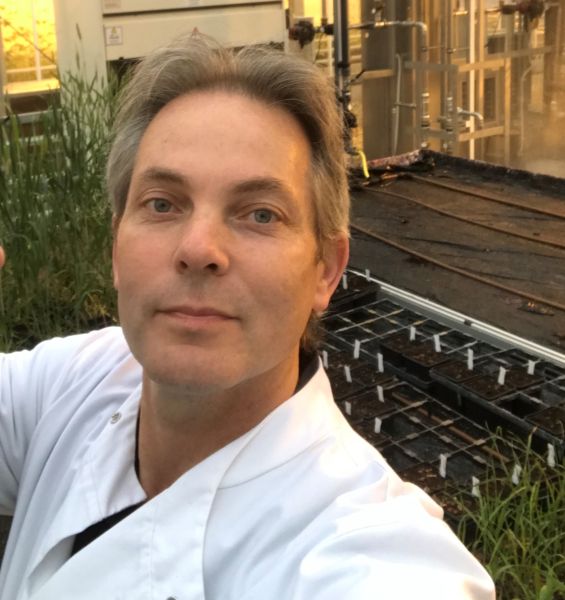Pathogenomics and disease resistance
Kostya leads the Pathogenomics & Disease Resistance group at the Crop Science Centre and is Head of Plant Pathology at NIAB where he leads strategic, applied, and commercial research encompassing biology, detection, surveillance, and management of diseases of field crops.
Kostya’s overall research interest is to understand how pathogens cause disease on plants and how plants resist pathogens at the mechanistic and molecular level. The group focuses on understanding the mechanisms of virulence in fungal and oomycete pathogens that cause diseases of global importance in wheat and pulse crops (broad and common beans, peas) such as Septoria tritici blotch, rusts, and downy mildews as well as elucidate the genetic basis of host resistance and leverage this knowledge to developing sustainable solutions for disease control in crops.
Research areas
Role of microbial effectors in plant-pathogen interactions
The ability of pathogens to cause disease in plants is enabled through the secretion of effector proteins. Pathogens deliver effectors either inside plant cells or outside, in the apoplastic space. Depending on the pathogen, the number of effectors produced during infection can be in the hundreds, indicating importance of these proteins in infections. The primary function of effectors is thought to be to disarm the plant through interfering with recognition by the immune system and induction of defence responses, or by affecting other aspects of host plant metabolism and/or development. Some effectors can be recognised by plant disease resistance (R) genes to initiate defence responses, and in these situations, they are termed avirulence (Avr) effectors.
We are interested in identifing and characterising Avr effectors in fungal rust pathogens of cereal and legume crops, as well as in Zymoseptoria tritici – another globally important fungal pathogen of wheat, with the aim of developing a molecular toolbox for monitoring pathogen populations and identification of any new virulent races. We are also interested in understanding what plant cellular processes are manipulated by the effectors and how effectors achieve the various virulence functions. This will help identify new targets for disease control through conventional breeding or genetic engineering/genome editing approaches.
Host plant resistance to diseases
Pathogens, including fungi, oomycetes, bacteria, and viruses pose major threats to crop plant health and global food security. Fungicides are used extensively to control many crop diseases, often due to lack of durable genetic resistance in crops or knowledge on natural plant immunity. There is an urgent need to develop new strategies for durable disease control through improved crop genetics, and this could be achieved through an improved understanding of the different immunity layers and pathways that plants deploy against pathogens. Plants can recognise pathogens via iterations of the widely described immune systems, namely Pattern-triggered Immunity (PTI) and Effector triggered Immunity (ETI). These usually operate in different cellular compartments and have different mechanisms to provide protection.
We are interested in improving the understanding of intracellular nucleotide-binding site leucine-rich repeat immune receptors (NLRs) in common bean and cell surface located wall-associated receptor-like kinases (WAKs) in wheat, and their role in resistance against biotrophic and hemi-biotrophic fungal pathogens, respectively. We are also interested in identifying and characterising genetically new, improved sources of resistance to fungal and viral pathogens of wheat and legume crops, such as common bean and faba bean. This includes exploration of natural and derived genetic resources such as synthetic hexaploid wheat lines, ancestral species introgression lines, and wild interspecies hybrids.
Antimicrobial resistance
Antimicrobial resistance (AMR) is a growing threat to global health, and the excessive use of antimicrobials in agriculture is a major contributor to its development. Plant pathogenic fungi pose a significant problem for food safety and quality, and with fewer fungicides available due to stricter regulations, the risk of AMR development is increasing. Cereals occupy the largest agricultural area in Europe and most developed countries and, due to high fungicide inputs, production of cereals contributes to evolution of AMR in fungal pathogens causing the most important foliar diseases such as Septoria, Ramularia, net blotch, mildews, and rusts. Moreover, fungicide use in agriculture is considered to be a driving factor in the emergence of resistance to azole fungicides in environmental populations of the opportunistic human pathogenic fungi, such as Aspergillus fumigatus.
We are using traditional, as well as aerobiome-based molecular (DNA based) surveys, to monitor AMR and ecological experiments to map and understand the eco-evolutionary processes driving fungicide resistance in populations of fungal wheat pathogens such as Zymoseptoria tritici and yellow rust as well as in A. fumigatus.
About the group leader
Kostya joined NIAB in 2021 from Rothamsted Research where he has led a variety of projects focused on resistance to viral and fungal diseases in barley and wheat that resulted in several principal scientific discoveries and practical solutions. Prior to that, following a PhD in plant virology, he did his postdoctoral study at the Sainsbury Laboratory, Norwich which resulted in the isolation of potato genes Rx and Gpa2 for resistance to viruses and nematodes and equipped Kostya with an-depth knowledge of plant gene silencing. With this background, Kostya extensively utilises both existing and newly developed plant virus-based expression tools, VIGS and VOX, for rapid gene function analysis in plants and associated pathogens.



















